
-
 US withholds $3.6 mln payment to WADA after no audit
US withholds $3.6 mln payment to WADA after no audit
-
Venezuela opposition decry crackdown before Maduro swearing-in

-
 US Fed officials concerned over 'stalled' disinflation, tariffs: minutes
US Fed officials concerned over 'stalled' disinflation, tariffs: minutes
-
Whole streets burn as fires rage around Los Angeles

-
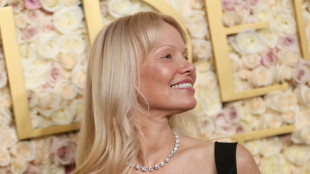 Celebrities flee Los Angeles fires as Hollywood events scrapped
Celebrities flee Los Angeles fires as Hollywood events scrapped
-
Several US Fed officials concerned over 'stalled' disinflation: minutes

-
 Kiwi blaster Guptill retires from international cricket
Kiwi blaster Guptill retires from international cricket
-
Celebrities flee Los Angeles blazes as Hollywood premieres scrapped

-
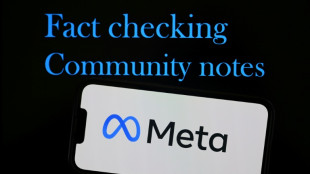 Meta's 'Musk playbook' fans misinformation concerns
Meta's 'Musk playbook' fans misinformation concerns
-
Dani Olmo cleared to play for Barcelona by Spanish sports council

-
 Man Utd's Maguire given driving ban for speeding
Man Utd's Maguire given driving ban for speeding
-
Neymar says 2026 World Cup will be his last

-
 Arsenal's Man Utd clash headlines intriguing FA Cup third round
Arsenal's Man Utd clash headlines intriguing FA Cup third round
-
Norway's McGrath leads Madonna di Campiglio World Cup slalom

-
 Israel army says body of hostage retrieved from Gaza
Israel army says body of hostage retrieved from Gaza
-
US tech titans ramp up pressure on EU

-
 Mexican president trolls Trump, suggests US renamed 'Mexican America'
Mexican president trolls Trump, suggests US renamed 'Mexican America'
-
'Democracy won', says Lula two years after Brasilia riots

-
 Sweden says Christmas tree needles safe to eat -- after Belgian warning
Sweden says Christmas tree needles safe to eat -- after Belgian warning
-
Al-Rajhi takes Dakar stage as five-time champion Al-Attiyah slips down

-
 Hydrants run dry in LA fire battle, residents urged to save water
Hydrants run dry in LA fire battle, residents urged to save water
-
UN peacekeepers patrol in Lebanon as truce deadline nears

-
 Opponents decry Venezuela crackdown ahead of Maduro swearing-in
Opponents decry Venezuela crackdown ahead of Maduro swearing-in
-
'Wicked' tops SAG Awards nominations

-
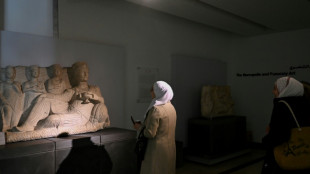 Safe from looting, Damascus museum reopens a month after Assad's fall
Safe from looting, Damascus museum reopens a month after Assad's fall
-
UK music sales hit record year, helped by Swift: industry
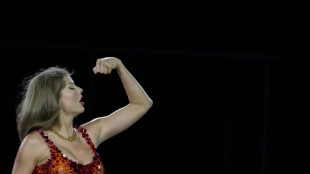
-
 Brest to play Champions League knockout games in Guingamp
Brest to play Champions League knockout games in Guingamp
-
Two dead, significant injuries in Los Angeles blazes

-
 Award-winning migrant actor earns visa to stay in France -- as a mechanic
Award-winning migrant actor earns visa to stay in France -- as a mechanic
-
Russian strike on Ukraine's Zaporizhzhia kills 13

-
 Ancelotti says Vinicius red card ban unfair
Ancelotti says Vinicius red card ban unfair
-
Italian reporter jailed in Tehran returns to Italy

-
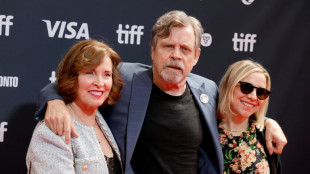 Celebrities forced to flee Los Angeles blazes
Celebrities forced to flee Los Angeles blazes
-
UN denounces spike in Russian executions of Ukrainian PoWs

-
 Lula marks anniversary of Brasilia riots with restored artworks
Lula marks anniversary of Brasilia riots with restored artworks
-
West Ham sack manager Lopetegui with Potter expected to take over

-
 Biden says he could have defeated Trump
Biden says he could have defeated Trump
-
US tariff and inflation fears rattle global markets

-
 Thousands flee as Los Angeles wildfires burn out of control
Thousands flee as Los Angeles wildfires burn out of control
-
Spanish PM says Musk 'stirs up hatred', warns against fascism

-
 Bournemouth striker Unal tears ACL in training session
Bournemouth striker Unal tears ACL in training session
-
US private sector hiring undershoots expectations: ADP

-
 Arteta mocked by League Cup organisers after 'tricky' ball excuse
Arteta mocked by League Cup organisers after 'tricky' ball excuse
-
US tariffs unlikely to have 'significant' inflation impact: Fed official

-
 Debris falling from the sky: more often, more risk
Debris falling from the sky: more often, more risk
-
Lebanon leaders in talks for new bid to elect president

-
 Antarctic sea ice rebounds from record lows: US scientists
Antarctic sea ice rebounds from record lows: US scientists
-
Can EU stand up to belligerent Big Tech in new Trump era?

-
 France goalkeeper Samba joins Rennes
France goalkeeper Samba joins Rennes
-
Global stocks diverge on renewed US inflation fears

| CMSC | -0.56% | 23.1 | $ | |
| RBGPF | -4.54% | 59.31 | $ | |
| SCS | 0.62% | 11.27 | $ | |
| RELX | 1.46% | 46.66 | $ | |
| RYCEF | -0.42% | 7.17 | $ | |
| NGG | -1.6% | 57.68 | $ | |
| CMSD | -0.29% | 23.392 | $ | |
| RIO | 0.43% | 58.44 | $ | |
| JRI | -0.58% | 12.15 | $ | |
| BCC | -0.65% | 117.46 | $ | |
| GSK | -0.75% | 33.835 | $ | |
| VOD | -2.62% | 8.195 | $ | |
| BCE | -1.1% | 23.6 | $ | |
| AZN | 0% | 66.64 | $ | |
| BTI | -0.51% | 36.595 | $ | |
| BP | -2.59% | 31.025 | $ |

Venezuela arrests two Americans, five other 'mercenaries'
Venezuelan President Nicolas Maduro on Tuesday announced the arrest of seven foreigners -- including two Americans -- whom he accused of being "mercenaries" trying to prevent him from being sworn-in for another six years in power.
Maduro said the Americans, two Colombian "hitmen" and three "mercenaries" from the war in Ukraine were involved in plotting unspecified "terrorist acts" ahead of his planned inauguration Friday.
"I am sure that in the next few hours they will confess," Maduro said in a broadcast on state television, before declaring a mass deployment of police and military across the country.
The announcement of Americans being detained came just hours after President Joe Biden welcomed exiled Venezuelan opposition candidate Edmundo Gonzalez Urrutia in the United States.
During the meeting, Biden backed a "peaceful transfer back to democratic rule" in Venezuela and warned against further repression inside the country.
The United States and several of Venezuela's democratic neighbours believe Gonzalez Urrutia won a July presidential election by a landslide and that official results were falsified.
The opposition has called for "millions" of Venezuelans to turn out in protest Thursday to prevent Maduro from retaining power and being officially sworn in.
They face an uphill battle. The 62-year-old Maduro and his political mentor Hugo Chavez, who died in 2013, have between them ruled Venezuela for the last quarter century.
Both have swatted aside waves of international and domestic pressure, retaining power through populist appeal, disputed elections and the might of the military, police and paramilitary gangs.
- 'Hooded men' -
Faced with a new challenge, Maduro has again turned to the security forces to dull international and domestic pressure.
His forces have detained several foreigners, including an Argentine policeman, rounded up local opponents and targeted family members of opposition leaders in hiding.
Gonzalez Urrutia said Tuesday his son-in-law Rafael Tudares was kidnapped from a Caracas street, spirited away in a gold-colored van.
The father of his grandkids was "intercepted by hooded men, dressed in black" during the morning school run.
Tudares remains "missing at this time," the 75-year-old diplomat-turned-opposition-politician said in a social media post.
Opposition figurehead Maria Corina Machado said Tuesday her family had also been targeted.
In a message from hiding inside Venezuela, she accused "agents of the regime" of surrounding her mother's house, flying drones overhead and cutting power to the neighborhood.
"My mom is 84 years old, she's sick with chronic health problems" she posted on X, "Maduro and company, there is no limit to your evil. Cowards."
She has called for supporters to turn out in "millions" on Thursday and said she would be there herself.
Meanwhile masses of security services have been deployed to the streets of Caracas, with Russian assault rifles handed out to pro-regime militia members parading at the presidential palace.
A pro-Maduro rally is also planned for Thursday.
It is unclear whether the opposition can convince Venezuelans, wearied by decades of economic crisis and fearful of government vengeance, to demonstrate in large numbers once again.
More than 20 people were killed in mass protests and rioting after the election, and nearly 200 were wounded.
Another 2,400 people were arrested in a sweeping crackdown on dissent, of whom around 1,500 have since been freed, according to authorities.
Carol Pedroso, professor of international relations at the Federal University of Sao Paulo in Brazil, told AFP the opposition was "unlikely" to oust Maduro in the short term unless it "has a trick up its sleeve."
Most experts agree that the role of the armed forces will be key. So far there has been little sign they will split with Maduro.
When Gonzalez Urrutia recently called for the armed forces to recognize him as their commander-in-chief it was summarily rebuffed.
Defense Minister Vladimir Padrino insisted the "loyalty, obedience and subordination" of the armed forces was for Maduro.
- 'The last straw' -
Meanwhile millions of Venezuelans have voted with their feet.
Under Maduro, the economy of the oil-rich and once-wealthy has imploded.
More than seven million Venezuelans -- almost a quarter of the population -- have sought a better life abroad.
Faced with the prospect of six more years of economic chaos, international sanctions and domestic repression, more are packing their bags.
Susej Ramos, a 30-year-old nurse, told AFP Maduro's reelection claim was "the last straw" for her.
She and her brother plan to leave later this year, hoping to reach the United States.
J.Horn--BTB
